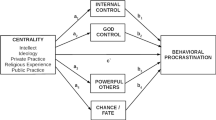Abstract
This study was designed to investigate the relationship between three stances in attitudes to authority and levels of intrapsychic and interrelational of maturity in women religious in initial stages of membership. Subjects were drawn from congregations throughout the U.S. from those involved in programs of formation or temporary commitment. The total sample (N = 162) was divided into three equal-attitude groups (N = 54), using complementary but uncorrelated measures of attitudes to institutional authority and directiveness. Relationship between the behavioral rating of directiveness seemed associated with intrapsychic measures of individuation, with those scoring as most directive found most mature from this perspective. Maturation rated from an intergenerational system approach seemed to be associated with pro-authority attitudes, with those most supportive of authority scoring highest on this construct. Implications for further research as well as work with religious in formation are suggested.
Similar content being viewed by others

References
Robin, G., “Authority and Leadership,” The Way, Supplement 55 (1989), pp. 119–130.
Kinerk, E., “Formation and the Vows,” The Way, Supplement 71 (1991), pp. 64–72.
Aldous, J., “American Families in the 1990's: Individualism Run Amok?” Journal of Family Issues 8(4) (1987), pp. 422–425.
Markham, D. and Sofield, L., “Narcissism and the Future of Religious Life,” Review for Religious 50(6) (1991), pp. 870–875.
O'Connor, D., “Dysfunctional Clergy and Religious,” Human Development 11(4) (1990), 43–48.
Private communication with the following provided the information on experiences of these formation personnel with candidates: private communication with Wilkie Au, June 3, 1992; Sheila Murphy, May 18, 1992; Patricia Spillane, July 6, 1991, and Rose Clarisse Gadoury, June 9, 1992.
Rulla, L. M., Imoda, F., and Ridick, J., Psychological Structure and Vocation. Rome: Gregorian University Press, 1988, p. 113.
Sabatelli, R., and Mazor, A., “Differentiation, Individuation, and Identity Formation: The Integration of Family System and Individual Development Perspectives,” Adolescence 20(79) (1985), p. 620.
Williamson, D., “Personal Authority via Termination of the Intergenerational Hierarchical Boundary—Part I: A ‘New’ Stage in the Family Life Cycle,” Journal of Marital and Family Therapy, 7 (1981), pp. 441–452; Williamson, D., “Personal Authority in Family Experience via Termination of the Intergenerational Hierarchical Boundary—Part III—Personal Authority Defined and the Power of Play in the Change Process,” Journal of Marital and Family Therapy, 8(1982), pp. 309–323; Bray, J., Williamson, D., and Malone, P., “Personal Authority in the Family System: Development of a Questionnaire to Measure Personal Authority in the Intergenerational Family Process,” Journal of Marital and Family Therapy, 10(2) (1984), pp. 167–178.
Williamson, D., 1982, p. 311.
Bray, J. and Harvey, D., Intimacy and Individuation in Young Adults: Development of the College Student Version of the Personal Authority in the Family Questionnaire, Houston, 1987, p. 12.
Anderson, S., and Fleming, W., “Adolescents' Perception of Aspects of the Home Environment and their Attitudes toward Parents, Self and External Authorities,” Adolescence 21(81) (1986), pp. 191–204.
Transeau, G. and Eliot, J., “Individuation and Adult Children of Alcoholics,” Psychological Reports (1990) 67, pp. 137–142.
Winnicott, D., Home Is Where We Start From: Essays by a Psychoanalyst. New York: Norton, 1990, p. 244.
Josselson, R., “Ego Development in Adolescence,” in Joseph Adelson, ed., Handbook of Adolescent Psychology. New York: Wiley, 1980, pp. 188–210.
Josselson, R., Greenberger, E., and McConochie, D., “Phenomenological Aspects of Psychosocial Maturity in Adolescence, Part II—Girls,” Journal of Youth and Adolescence, 6(2) (1977), pp. 145–167.
Ibid, p. 160.
Spillane, P., “Called to be Both Loyal and Prophetic,” In-formation 61 (1982), 1–4, p. 3.
Ibid.
Hoffman, J., “Psychological Separation of Adolescents from their Parents,” Journal of Counseling Psychology 31(2) (1984), pp. 170–178.
Ibid., p. 171.
Ibid., pp. 171–172.
Bray, J., Williamson, D., and Malone, P., “Personal Authority in the Family System: Development of a Questionnaire to Measure Personal Authority in Intergenerational Family Process,” Journal of Marital and Family Therapy, 10(2) (184), pp. 167–178.
Rigby, K., “Acceptance of Authority and Directiveness as Indicators of Authoritarianism: A New Framework,” The Journal of Social Psychology, 122 (1984), pp. 171–180.
Rigby, K. and Rump, E., “Attitudes to Authority and Authoritarian Personality Characteristics,” Journal of Social Psychology, 116 (1982), pp. 61–71.
Rigby, K., “A Concise Scale for the Assessment of Attitudes toward Institutional Authority,” Australian Journal of Psychology, 34(2) (1982), pp. 195–204.
Ray, J., “Do Authoritarians Hold Authoritarian Attitudes?” Human Relations, 29(4) (1976), pp. 307–325.
Ray, J. and Lovejoy, F., “The Behavioral Validity of Some Recent Measures of Authoritarianism,” The Journal of Social Psychology, 120 (1983), pp. 105–119.
Rigby, K. (1982), p. 202.
Rigby, op cit.
Ray, op cit.
Rulla et al., op cit., pp. 162–163.
Nygren, D. and Ukeritis, M. “Future of Religious Orders in the United States: Research Executive Summary,” Origins (1992) 22(15), pp. 258–272.
Hoffman, op. cit.
Josselson, R. Finding Herself. San Francisco: Jossey-Bass, 1987.
Rigby, K. and Rump, E., “Attitudes toward Parents and Institutional Authorities during Adolescence,” The Journal of Social Psychology, 109 (1981), pp. 109–118.
Spillane, op cit., p. 3.
Rulla et al, op cit.
O'Connor, D., Witness and Service: Questions about Religious Life Today. New York: Paulist Press, 1990, p. 65.
Bray, J., Williamson, D., and Malone, P., op. cit.
Bray, J. and Harvey, D., op. cit.
Ibid.
Rulla et al, p. 115.
Author information
Authors and Affiliations
Rights and permissions
About this article
Cite this article
Mayer, S. Attitudes to Authority in Women Religious. Journal of Religion and Health 36, 265–276 (1997). https://doi.org/10.1023/A:1027413208882
Issue Date:
DOI: https://doi.org/10.1023/A:1027413208882



